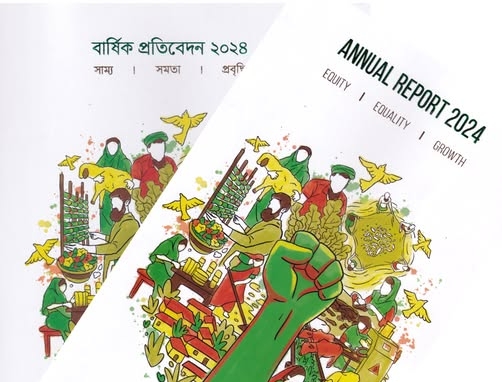Rezaul Karim Chowdhury
Published:2025-08-02 17:03:03 BdST
Hello world, we have PKSF story to tell
My elder son used to listen stories from his mother during his childhood in bedtime, always those are good stories to give mental peace and then he gets sleep. As a nation we have a story, a good story to tell others i.e. PKSF (Polli Karma Sohayak Foundation / Rural Employment Facilitation Foundation).
Recently they have published their annual report both in English and Bangla, statements are very brief, with graphical representation of coverage. The report attached with audited accounts of last year and names of 214 partner organizations in countrywide. Accountabilities wise they tried best possible transparency.
Graphical representations are in simple and easily understandable for readers, even Bengali report is easy understandable to the field workers. But wight is very heavy as they have used costly papers, it could be done in light weight/newspaper with good printing. So that it will be easy for readers like me, who take reports in backpack, whenever I get time read in time to time, some time again and again.
They cover 20 million poor families, i.e., more than 2/3 of the country population, where more than 90 % females along with 214 partner organization (COAST is one of them working in coastal areas of Bangladesh).
All figures mentioned in this article are in Bangladeshi Taka. These group members have savings of BDT 282.74 billion, while PKSF disburse 1151.23 billion while loan outstanding to members plus around 713.58 billion including disbursement from partner organizations.
PKSF Chairman Zakir Ahmed Khan in his preface envisaged to give emphasize on poverty alleviation in Southern Part of Bangladesh where partnership organization’s density is low and gave importance to using AI (Artificial Intelligence) and digitization. Its Managing Director Md Fazlul Kader for future gave emphasize on young population, employing job less young and climate smart technologies.
The report has given description of 6 loan package, 6 climate projects, 6 micro enterprise projects, 1 ultra-poor project, one water and sanitation project, 1 holistic integrated development program, and 1 innovation facilitation program.
As COAST experiences, PKSF institutional development facilitation is splendid, especially in respect of accounting and internal control, they also gave training and advice in respect of management and leadership development for MFIs (Micro Finance Institutions), most of PKSF MFIs are micro finance plus, they do health, education, disaster management, technical/skill development training to youth, community radio, integrated agriculture product diversity and housing etc. with surplus from their micro finance operation.
As now a days PKSF has lot of projects in partnership hope that they will not loss focus on MFIs’ institutional development. I used to say that a PKSF field visit mean which is eye opener / good mental peace, thus for good sleep for a chief executive like me.
Whole micro finance sector has an advantage now, i.e., for regulation now MRA (Microcredit Regulatory Authority) have been established under Bangladesh Bank, they have already set standard mechanism to control governance, asset, and capital accumulation, safeguarding savings of the poor families and client interest. MRA has been appreciated by the ministry as one pioneer institution in respect of digitization.
We draw attention of both PKSF and MRA in respect of some challenges in the sector,
(i) in most places group members are found having the membership of 4/5 NGOs, positive side of the practice is that, borrowers need are meet as they hardly get big size of loan, but will it creating pauperization and perpetuating indebtedness of the borrower?
(ii) there are competition among MFIs for salary enhancement, especially in top level, except some founding executives, some top executives show a tendency to change job for higher salary and facilities, there are two issue in this regard, ultimately this is creating a pressure on field workers with per capita outstanding, second issue is this is a kind of mission drift as origin of the sector is for social welfare and empowerment, hardly for consumerism and corporatization;
(iii) sometime rampant misappropriation is being observed among field staff, while field staff primarily responsible for collecting and disbursement, this could be drastically reduced through digitalization and if there will be cashless transaction in field through MFS (Mobile Financial Service).
Around 10/12 MFIs has established their own software development unit, mostly doing the same job, this should be coordinated to avoid duplication of investment. On top MFS service which are available in the market they are costly especially for poor borrowers, especial MFS service software should be developed for these poor families, so that these borrowers will get some relief.
As a management learner, my learning, how these organization sustain and grown without any external consultancy, fully with Bangladeshi staff without financial dependency.
How they manage one step service, continuous innovation, easy going approach, stable human resources, successfully implementing around 10 to 15 donor funded projects.
It is the one of the two organization that the GCF (Green Climate Fund) has recognized as an entity to receive. Let us celebrate the success, analyze the learning for organizational development and stand behind to build a discrimination free Bangladesh.
Unauthorized use or reproduction of The Finance Today content for commercial purposes is strictly prohibited.


